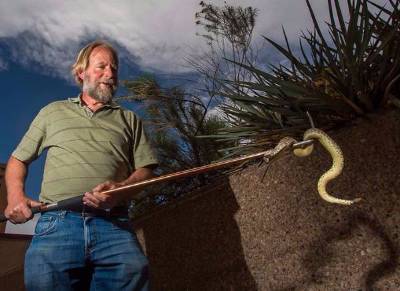Small classes, Big Opportunities
Our bachelor’s degree in Biological Sciences stands out for its personalized, student-friendly approach. You’ll work directly with senior faculty who place high priority on undergraduate teaching. The result is an exceptionally rich bachelor’s degree experience. You’ll enjoy advanced opportunities that typically don’t come along until graduate school, including opportunities to assist full professors in laboratory research and field investigations.
Our faculty, academic advisors and career counselors offer extensive support to ensure that you get the most out of your biology bachelor’s degree. You’ll choose one of four concentrations, depending on the career path you’d most like to pursue. No matter which concentration you select, you’ll build real-world skills and expertise to prepare you for the next step on your journey—be it medical school, graduate studies, laboratory research, teaching or another career.
Degree Options
B.S. in Biological Science: Pre-health and Biomedical Science emphasis
The pre-health emphasis area prepares you for a career in medical and paramedical professions. You’ll fulfill prerequisites for medical school, dental school, veterinary school and other health-related postgraduate programs. This area also provides you with a strong background for employment or continued study in medical-related research, biotechnology, pharmaceuticals or health care communications.
B.S. in Biological Science: Cell and Molecular Biology emphasis
In this basic science emphasis area, you’ll acquire a solid understanding of biological principles focused on the basic unit of life: the cell. The program covers all prerequisite courses for medical, dental, veterinary and other health-related professional schools. You can also use it as a foundation for graduate studies or employment in fields such as public health, medical research, forensic biology, agricultural sciences, biodiversity studies and many others.
B.S. in Biological Science: Ecology and Evolution
This program emphasizes a broad understanding of the biological principles underlying all living systems. Students successfully completing this program will be prepared to choose from a widely varied range of careers that require a solid foundation of biology knowledge in addition to other science and technology training.
B.S. in Biological Science: Secondary Teaching
If you’re interested in a career as a science teacher, this program provides you with all the required preparation (including student teaching) to qualify you for the state licensing exam. You’ll gain a broad background in biological subject matter, along with practical field experience in middle- and high-school classrooms and coursework in classroom management, instructional techniques, curriculum development and assessment.
B.S. in Biological Science: Liberal Arts
If you’re interested in a career as a science teacher, this program provides you with all the required preparation (including student teaching) to qualify you for the state licensing exam. You’ll gain a broad background in biological subject matter, along with practical field experience in middle- and high-school classrooms and coursework in classroom management, instructional techniques, curriculum development and assessment.
Biological Sciences Minor
The 20-credit minor in Biological Sciences is ideal for students who are majoring in another discipline, but also want a level of expertise in biology. This minor is commonly paired with a major in chemistry, psychology, sport and exercise science, dietetics, nutrition or environmental and sustainability studies. The minor is structured to offer flexibility for students to take coursework in the specific areas of biology they are interested in.
Your Future in Biology
With attentive faculty and personalized advising, UNC provides you with maximum support to help you get the most out of your biology bachelor’s degree. Well-trained scientists are in high demand in all sectors and industries; this means finding your own niche can be daunting. Our biology program offers maximum versatility, enabling you to tailor your studies to almost any career goal. We’ll help you choose the courses, special projects, extracurricular activities and summer programs that fit your objectives.
Consider UNC’s B.S. in Biological Sciences if you want to:
- Become a doctor, dentist or other health professional
- Pursue a research career
- Teach science in middle school or high school
- Work in a science-related industry such as pharmaceuticals, energy or environmental management
You’ll learn:
- Principles of cellular biology and genetics
- Real-world biological applications
- Laboratory techniques
- Human, plant and animal biology
- Environmental and ecological relationships
- Research design and methods
Sample courses:
- Principles of Biology
- Cell Biology
- Ecology
- Microbiology
- Conservation Biology
- Cancer Biology
- Developmental Biology
- Genetics
- Evolution
Beyond the Classroom
All emphasis areas in the biology bachelor’s degree program include some form of practical experience. Depending on your interests and career goals, you may complete a professional internship, capstone project, directed research project, student-teaching placement or other form of applied study. Colorado is blessed with a rich and diverse biological environment, providing you with an extraordinary range of opportunities for in-depth investigation. As part of your biology bachelor’s program, you may be able to assist senior faculty on a research project.
Where can your degree take you?
- Medical, dental, veterinary or another professional health school
- Graduate school in biology, ecology, environmental science or a related field
- Employment in a science-related field such as pharmaceuticals, health care, public health, agriculture, environmental regulation or resource management
Ready for what's next? Here's what you need to know.
If there's anything else we can do, be sure to connect with us. We're only a shout away.
Still not completely sold? We understand. Here's more information on cost and aid and how to apply.




